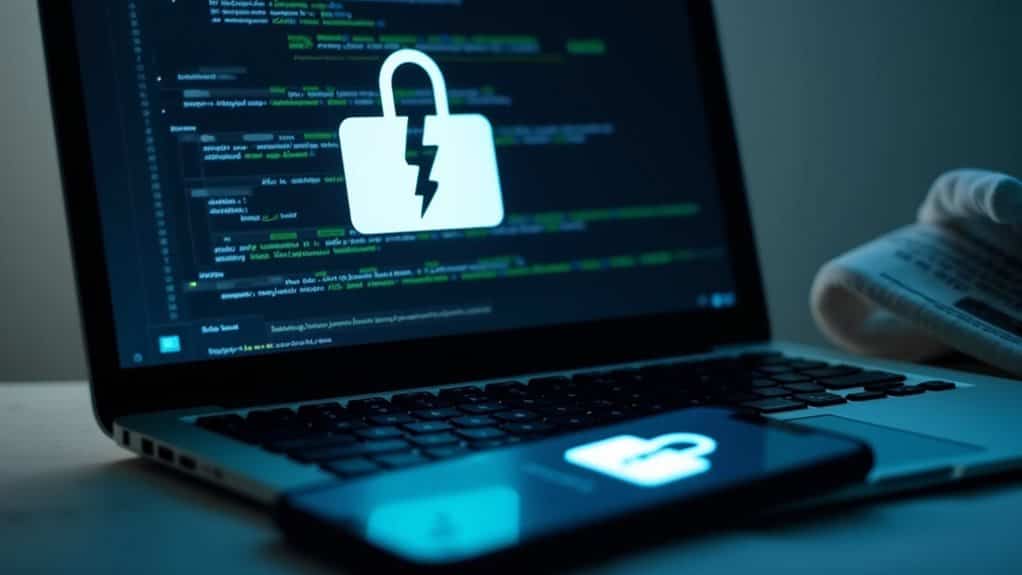ProtonMail offers legitimate end-to-end encryption that protects your messages from nearly everyone, including ProtonMail itself, through its zero-access architecture. However, it’s not foolproof—Swiss courts can compel metadata disclosure, emails from non-Proton users briefly appear in plaintext on servers, and weak passwords or web vulnerabilities can compromise security. The service excels at privacy through open-source code and independent audits, but you’ll need realistic expectations about its limitations. The sections below examine exactly what ProtonMail secures and where gaps remain.
Quick Guide
- End-to-end encryption and zero-access design ensure ProtonMail cannot read stored emails, providing genuine security advantages.
- Swiss privacy laws offer strong legal protections, though metadata can still be collected under lawful authority requests.
- Open-source codebase and independent security audits allow public verification, backing ProtonMail’s encryption claims with transparency.
- Emails from non-Proton users briefly appear in plaintext on servers before encryption, limiting complete end-to-end protection.
- Free accounts have storage limitations and lack data backups, with weak passwords or web vulnerabilities potentially undermining security.
End-to-End Encryption and Zero-Access Architecture Explained

When you send an email through ProtonMail, the service employs two distinct but complementary security mechanisms: end-to-end encryption (E2EE) and zero-access design.
E2EE encrypts messages on your device before transmission, ensuring only you and your recipient can read them.
Zero-access framework means ProtonMail stores your emails encrypted with keys they can’t access, protecting your data even if their servers are compromised. Many users also pair ProtonMail with a VPN for additional privacy when sending messages.
However, emails arriving from non-Proton services like Gmail are briefly visible in plaintext to Proton’s servers before being encrypted for storage in your mailbox.
Privacy Protections and Anonymity Features
While ProtonMail’s encryption protects your message content from prying eyes, the service’s privacy protections extend far beyond just scrambling your emails.
You’ll benefit from Swiss privacy laws that limit government access, email tracker blocking that prevents monitoring, and zero behavioral profiling for ads.
However, understand that ProtonMail prioritizes privacy over anonymity—metadata collection remains necessary, and Swiss authorities can request this information under legal circumstances. You can further protect your account by enabling two-factor authentication, which requires a six-digit code from an authenticator app even if someone obtains your password. Private Internet Access also offers no traffic logs on its VPN service, providing a complementary privacy layer for your internet activity.
User Experience and Cross-Platform Migration

Switching to ProtonMail from Gmail, Outlook, or Yahoo is streamlined through built-in import tools that transfer your contacts and email history while preserving folder structures.
You’ll find the migration process straightforward, though free accounts face storage limitations that may restrict how much data you can bring over.
ProtonMail’s integrated PGP encryption works automatically in the background, so you won’t need to manage cryptographic keys manually like traditional encrypted email solutions require.
You can also verify connection security by checking for DNS and IP leaks with tools like DNS leak tests to ensure your data is routed and protected correctly.
Migrating From Major Providers
If you’re considering a move to ProtonMail from Gmail, Yahoo Mail, or Outlook, you’ll find the process more straightforward than you might expect.
ProtonMail’s Easy Switch tool supports IMAP-based imports from these major providers, preserving your folder structure and email metadata throughout the transfer.
You’ll proceed to Settings, authenticate your old account, select folders to import, and let the migration run in the background while you continue working.
Built-In PGP Simplicity
One of ProtonMail’s standout features is how it converts PGP encryption from a technical hurdle into an invisible safeguard.
When messaging other ProtonMail users, key generation, exchange, and encryption happen automatically—no manual setup required.
You can also communicate with non-ProtonMail recipients using OpenPGP standards by importing their public keys through the web interface.
Key pinning alerts you to unexpected changes, enhancing security.
Account Security Best Practices and Requirements
When protecting your ProtonMail account, implementing strong security measures isn’t optional—it’s essential to safeguarding your sensitive communications from unauthorized access and cyber threats.
Enable two-factor authentication immediately, combining your password with a smartphone app or hardware token. Create a unique, complex password you don’t reuse elsewhere, and consider using a password manager. Configure recovery methods carefully, and regularly review your account’s login activity to detect unauthorized access attempts promptly.
When Proton Mail’s Encryption Falls Short

Although ProtonMail’s end-to-end encryption provides strong protection for your emails, several technical limitations and implementation challenges can compromise your data’s security.
Web application vulnerabilities have allowed malicious code injection in the past. Weak passwords make your encrypted keys vulnerable to brute force attacks. The service lacks zero-knowledge password proofs and doesn’t provide data backups, meaning deleted emails can’t be recovered.
Open Source Transparency and Independent Security Audits
Unlike many encrypted email providers that keep their code behind closed doors, ProtonMail has made its entire application suite—web, mobile, and desktop—completely open source. This allows global security experts to inspect the code and verify encryption claims directly.
Multiple independent security audits have been conducted, with reports publicly available. You’ll also find ProtonMail’s Key Transparency system on GitHub, enabling community review and contributions to strengthen security.
Wrapping Up
ProtonMail delivers strong end-to-end encryption and genuine privacy protections, making it a solid choice if you’re serious about email security. However, it’s not perfect—you’ll face limitations with non-ProtonMail users and certain metadata remains visible. The free tier works well for basic needs, while paid plans enable essential features. If you’re willing to accept these trade-offs and prioritize privacy over convenience, ProtonMail lives up to its reputation as a secure email provider.
